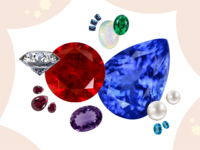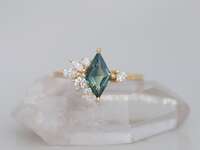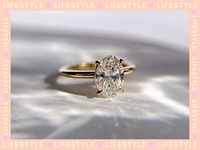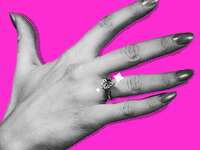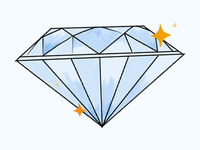Birthstone Engagement Rings—and Their Meanings—for Every Month of the Year
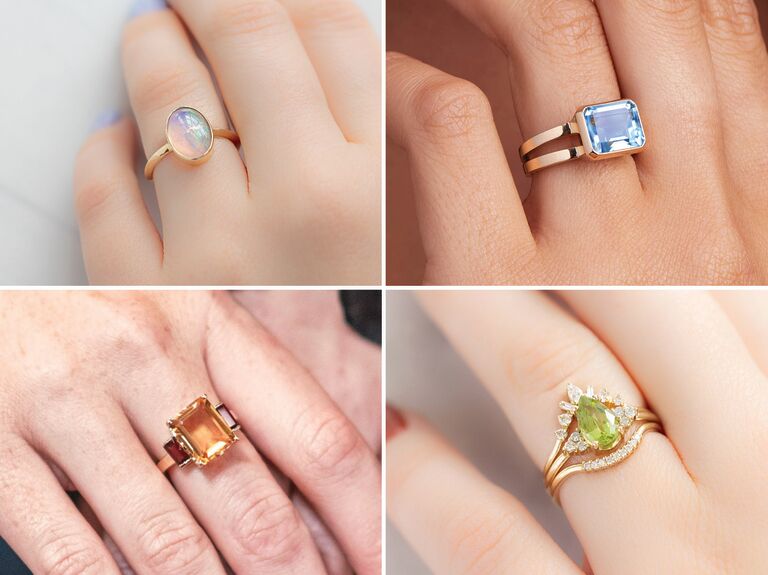
The concept of birthstones dates back as far as the 16th century and has evolved over time. And for as long as there have been birthstones, there have been birthstone engagement rings—but the colored stones are having even more of a moment lately as couples break ties with tradition in more and more ways.
"Birthstone symbolism developed over hundreds—or sometimes thousands—of years of culture, tradition and legends," explains Lisa Rosen, CEO of the International Gem Society, which specializes in birthstone and lab-grown diamonds. "The list of traditional or ancient birthstones most well-known in the United States actually originated in Poland between the 16th and 18th centuries. In 1912, the National Association of Jewelers released a list of so-called 'modern birthstones.' The modern list differed somewhat from the traditional, most notably by including only transparent gems. To this day, jewelers continue to add options to the modern birthstone chart. For example, spinel, citrine and tanzanite are recent modern additions."
Thanks to their unique symbolism, birthstones make for ultra-personalized and gorgeous engagement rings, whether used as the center stone or in an engagement ring with birthstone accents. However, some are better than others when it comes to practicality, affordability and durability. Here, we do a deep dive into every month's special stones.
In this article:
- Can a Birthstone Ring be an Engagement Ring?
- January Birthstone Engagement Rings
- February Birthstone Engagement Rings
- March Birthstone Engagement Rings
- April Birthstone Engagement Rings
- May Birthstone Engagement Rings
- June Birthstone Engagement Rings
- July Birthstone Engagement Rings
- August Birthstone Engagement Rings
- September Birthstone Engagement Rings
- October Birthstone Engagement Rings
- November Birthstone Engagement Rings
- December Birthstone Engagement Rings
Can a Birthstone Ring be an Engagement Ring?
A birthstone can absolutely be used for an engagement ring (really, there are no rules). "In fact, some birthstones make excellent engagement rings because they are much rarer than diamonds but deliver the same stunning brilliance," Rosen says. How you use the stone, of course, depends on personal style preference. "For someone looking to be unique or make a bold statement, a rare birthstone with an exceptional cut and color should be the main center stone," Rosen suggests. "For those looking for a more traditional diamond ring, using birthstones as accent stones or in the wedding band can add a pop of color and be meaningful."
January Birthstone Engagement Rings
Red gemstones such as January's garnet offer the perfect symbolism for engagement rings: They represent love and passion. That said, garnet isn't always red. "When you think of a garnet, you might think of the very common red gemstone that is known to gemologists as the almandine garnet," Rosen says. "But the garnet family of gemstones is actually one of the most complex in the world due to most garnets being mixtures of different species and varieties. This means that some garnets are very rare due to the unique geologic conditions that need to be present during formation." Her favorite is the rhodolite garnet, which boasts a mesmerizing reddish-purple hue. "With a Mohs hardness of 7 to 7.5, it's hard enough for an engagement ring and is a great substitute for a ruby," she says. Or, "for someone who wants a green gemstone that won't break the bank like an emerald, check out tsavorite garnet. It has similar hardness and bright green color, but fewer inclusions—which can eventually cause breakage—and more sparkle."
Neil Lane Square Cut Garnet Engagement Ring

Anyone who's watched The Bachelor knows that Neil Lane is the king of diamonds, but the famed jeweler also crafts engagement pieces featuring other gemstones, such as birthstones. This January birthstone engagement ring features Rosen's recommended rhodolite garnet, plus a border of sparkling round diamonds and antique-inspired milgrain edging.
Ross-Simons 13-Carat Garnet and Diamond Ring
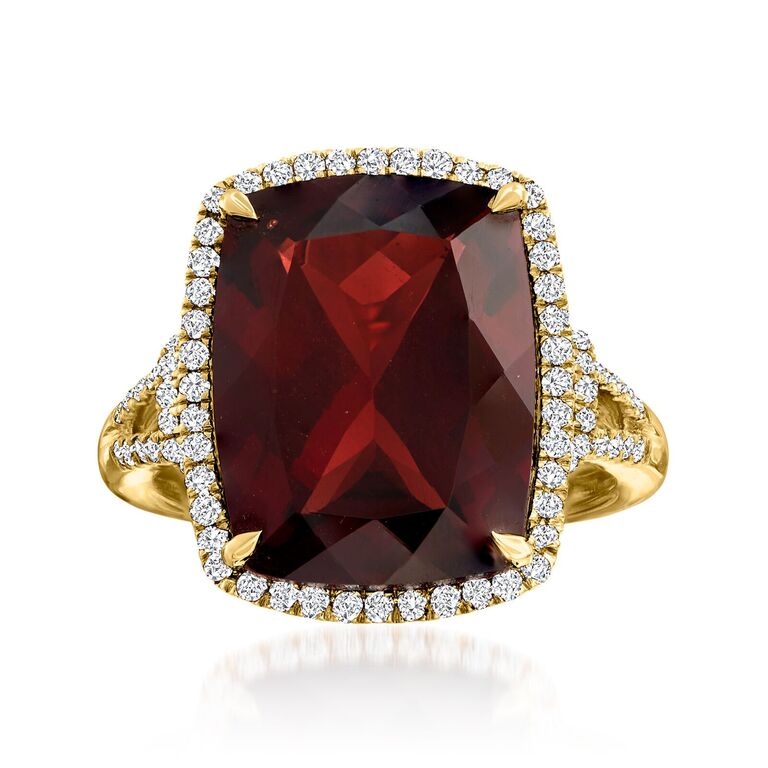
For those of the bigger-is-better mindset, a garnet is a great option: You can go big, such as with this incredible 13-carat garnet ring, for a relatively low price. Here, the yellow gold complements the rosy stone beautifully and a border of round diamonds totaling 0.4 carats adds additional sparkle.
The Rare Gemstone Company Rhodolite Garnet Trilogy Ring
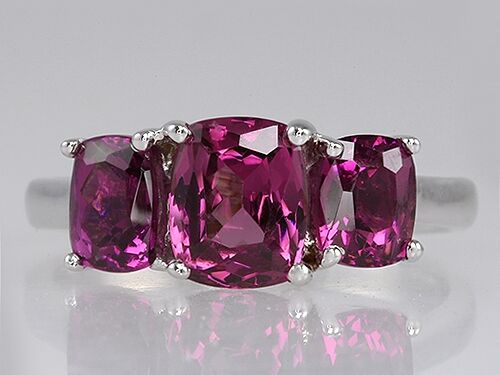
One of Rosen's birthstone engagement ring picks, this piece features not one rhodolite garnet but three in an on-trend trilogy setting. The center stone, sourced from Tanzania, is a little over 1.5 carats.
February Birthstone Engagement Rings
Amethyst is a type of crystalline quartz that comes in purple hues, from light pastel lilac to rich reddish purple. The hue is often associated with royalty and has come to represent mental clarity and healing. It ranks around a seven on the Mohs scale, meaning it is hard and scratch-resistant enough to feature in an engagement ring.
David Yurman Marbella Ring with Amethyst
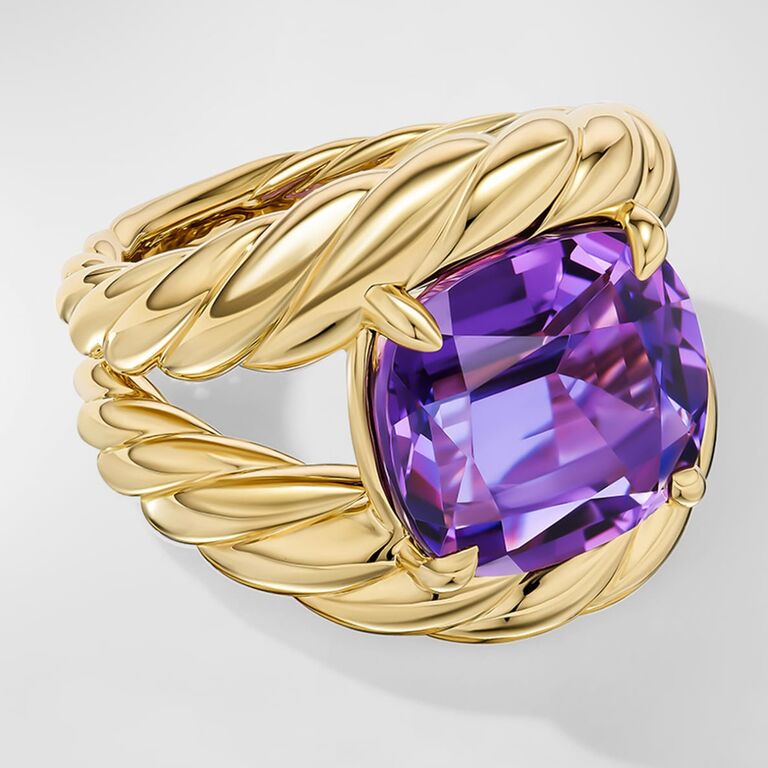
Being that it's so readily available, even really large amethysts are relatively affordable—so if your motto is go-big-or-go-home, this stone is for you. Here, David Yurman suspends a massive 20mm amethyst between two spiral bands of 18-karat yellow gold in an eye-catching piece that would make a beautiful engagement ring.
Ross-Simons Vintage Amethyst Ring in 18K Yellow Gold
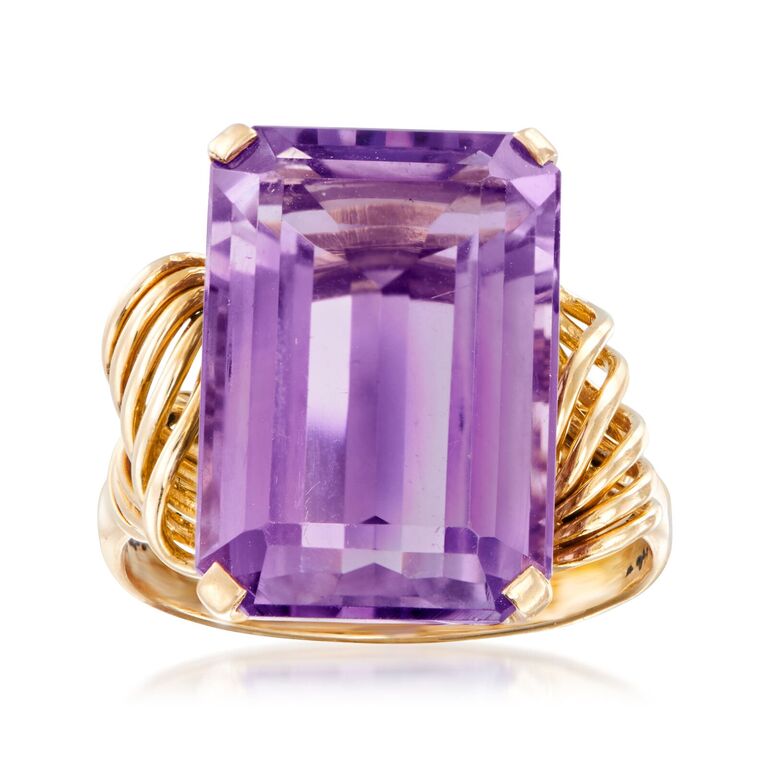
If you're looking for a one-of-a-kind February birthstone engagement ring, deep dive into estate jewelry. This vintage ring dates back to the 1960s and features an 8.5-carat emerald-cut amethyst.
Kay Jewelers Light Amethyst Ring with Diamonds

The lightest shades of amethyst almost give off diamond vibes, then offer a subtle and gorgeous hint of color in the right light. This pear-cut pastel stone is set in rose gold to amplify its pretty hue and is flanked on either side by brilliant round diamonds.
March Birthstone Engagement Rings
Aquamarine gets its name, naturally, from its watery blue hue—but the name also relates to its symbolism. "Aquamarine was traditionally believed to protect seamen, with its blue-green color being a gift from Neptune, the God of the Sea," Rosen explains. "The Roman myths around aquamarine evolved to where ancient Romans believed that aquamarine could protect against envy and spite. Subsequent evolutions of the myth said that aquamarine could bestow marital happiness to its wearer." It makes a meaningful engagement stone, then, and it's relatively affordable (depending, of course, on what other stones it is paired with).
Yi Collection Aquamarine and Emerald Spring Globe Ring in Platinum
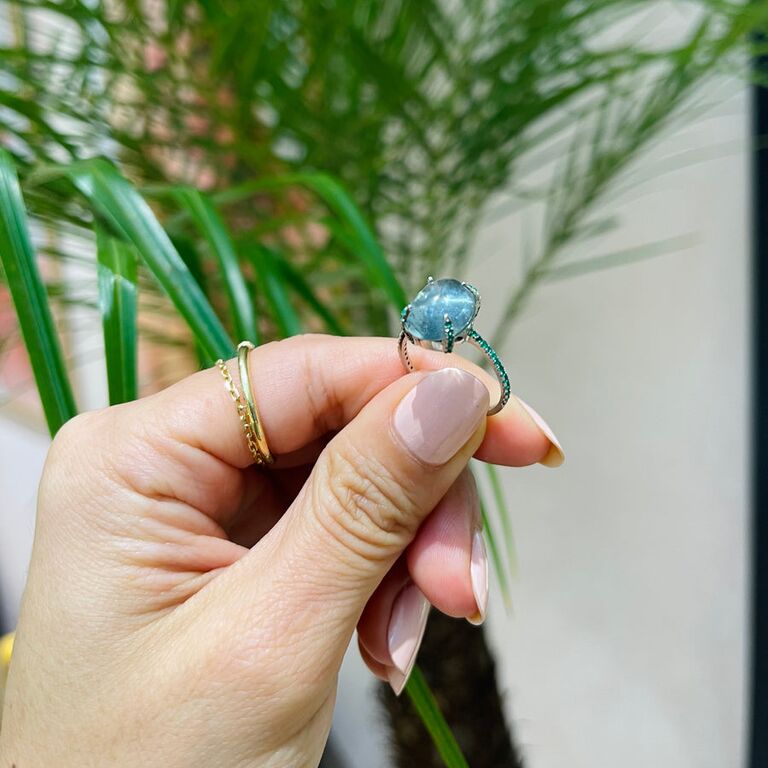
Why limit yourself to one colored stone? This blue-green combo of an aquamarine center stone and emerald accents (uniquely set into the prongs) gives a nod to nature—and a whole lot of unique sparkle. Pair it with an eternity wedding band in one of the two stone hues.
Haverhill Warren Horizontal Aquamarine Ring
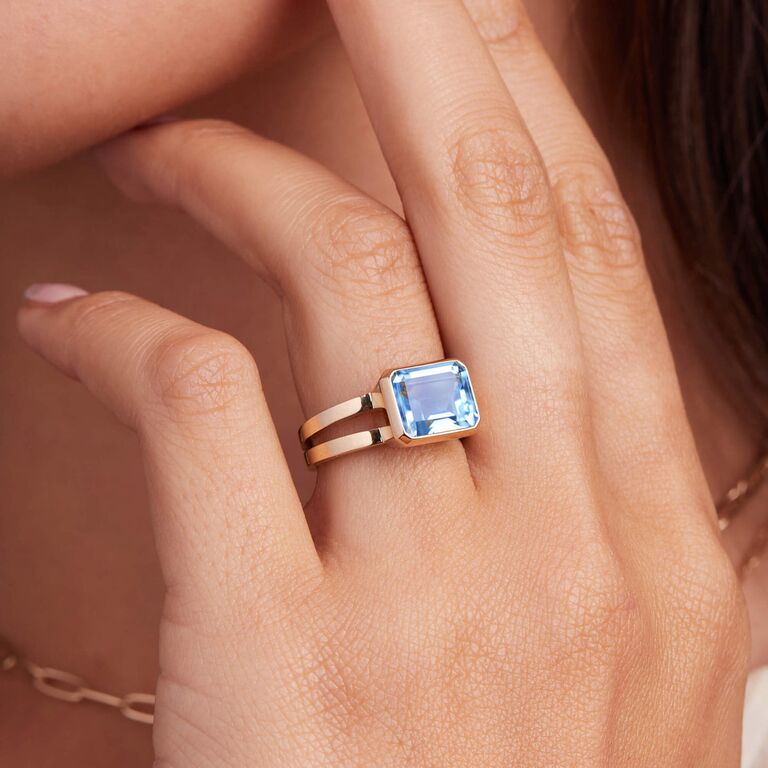
Bezel settings are having a moment and offer more protection from the everyday elements by surrounding the stone on all sides. Another trend? East-west settings, which see the stone sitting horizontally on the finger. This birthstone engagement ring for March hits all the trendy marks—but we promise you'll still love it for decades to come.
Tiffany Soleste Ring

If you're torn between diamonds and birthstones, opt for a halo setting in which the symbolic stone is surrounded by a border—or two!—of sparkle. Tiffany does it well, of course: This ring features an intensely colored 0.7-carat aquamarine and just under a half-carat of round diamond accents.
April Birthstone Engagement Rings
Diamond is the most traditional stone for engagement and wedding rings; it just so happens to also be the birthstone of April. The stone ranks highest on the Mohs scale of hardness, meaning its durability is perfect for everyday wear. It's rare and incredibly beautiful and has come to represent eternal love; it's often very expensive. Today, though, consumers have options. Lab-grown diamonds are surging in popularity: They're an ethical, sustainable alternative to natural diamonds and, more often than not, promise a bigger bang for your buck. And don't limit yourself to a colorless diamond: They come in a variety of hues like yellow and pink, though these are often even pricier.
Jade Trau Bridal Sadie Three-Stone Ring
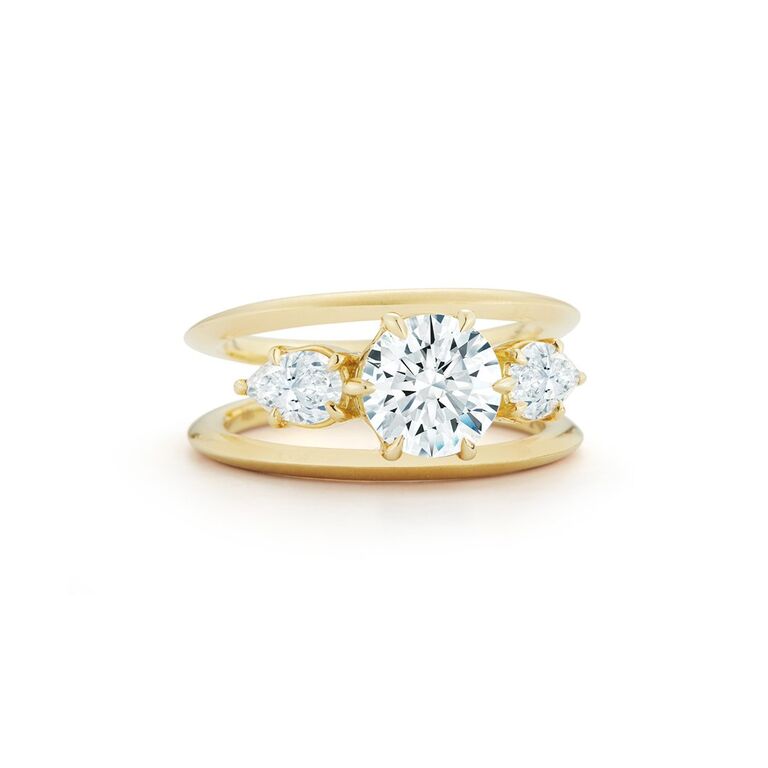
If you're opting for a diamond ring because it's your birthstone—and not just because it's tradition—look for something out-of-the-box that serves as a conversation piece. Jade Trau is a master of unique design: In this piece, a trio of diamonds seems to float between dual gold bands.
HauteCarat Emerald Cut Diamond Cigar Bezel Ring
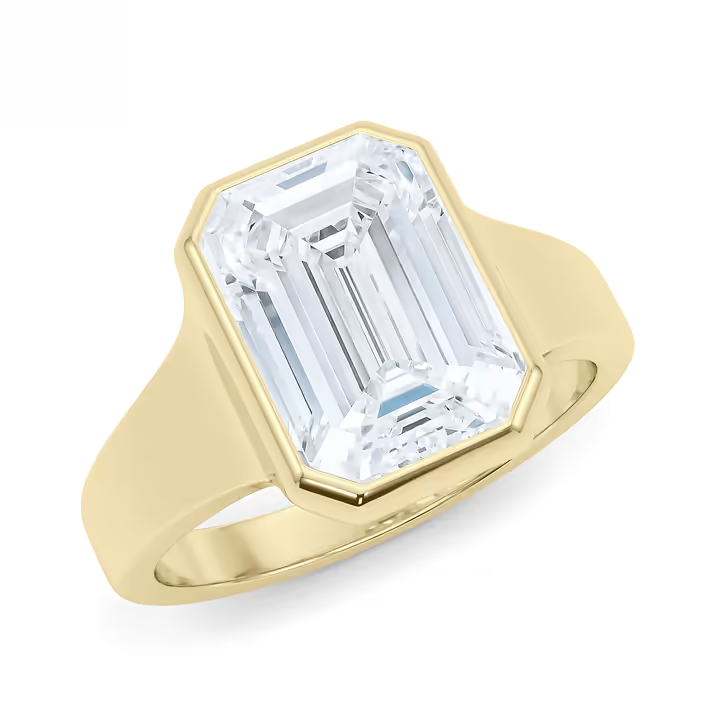
The rise in lab-grown diamonds offers couples alternatives that can help protect the environment and, in many cases, their wallets. HauteCarat was one of the first lab-grown purveyors on the market. The brand's cigar band bezel ring can be made with an emerald cut diamond in any carat weight from 1 to 6.
Anita Ko Duchess Eternity Ring

Anita Ko is another go-to for unique diamond pieces. This April birthstone engagement ring is a great option because it's simply made for stacking: Add eternity bands for milestone events like anniversaries or the birth of children, and watch your finger get shinier.
May Birthstone Engagement Rings
After the film Crazy Rich Asians was released in 2018, emerald engagement rings saw a surge. Their symbolism makes them an interesting and fitting choice. "Historically, emerald was known as 'a revealer of truths' and would help the wearer determine the truth or falsity of a lover's oath," Rosen says. "While some believed that emeralds would diminish one's lust for their partner, others believed wearing an emerald could help you see through the fog of infatuation to make a clear-headed decision about marriage." The stone ranks around a seven on the Mohs scale: It's acceptable for everyday wear, but note that lab-grown emeralds, alternatively, can be slightly harder.
Grown Brilliance Emerald and Diamond Hidden Halo Engagement Ring

While natural emeralds can be used in engagement rings, lab-grown ones are a great alternative from a cost and durability standpoint. This cushion-cut stone rings in at more than 9 carats and is surrounded by round diamonds in a hidden halo and down each side of the band. Opt for white gold for a more modern look or yellow gold for a vintage feel.
Diamondère Eugene Ring
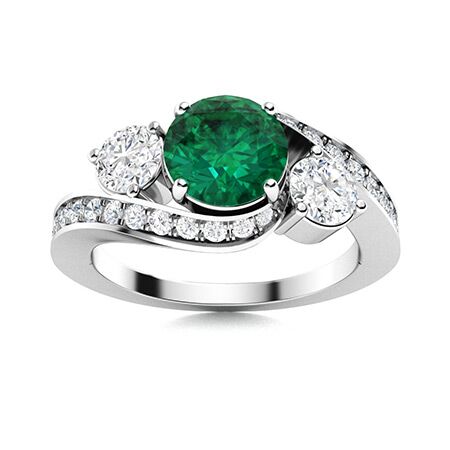
The natural emerald in this swirl-inspired ring is rated AAAA, which ranks it in the top 10% of the earth's green stones. Two diamonds sit on either side of it in a trilogy setting and additional diamonds are channel set in waves around the focal point.
Berlinger Emerald Deco Mosaic Ring
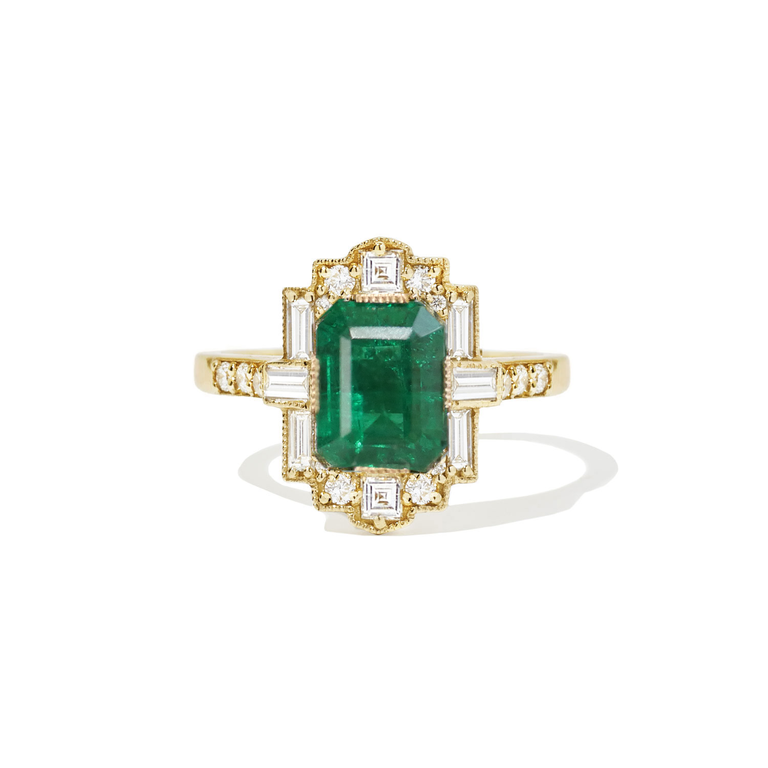
Los Angeles-based jewelry designer Michelle Berlinger is a master of art-deco-inspired pieces, and an emerald fits flawlessly into the aesthetic. Here, it's surrounded by baguette and round diamonds in a geometric setting that looks stunning in yellow or rose gold.
June Birthstone Engagement Rings
When jewelers changed all the birthstones to transparent gems in 1912, June's honorary stone went from pearl to alexandrite; however, both the traditional and modern stones are still used as birthstones today. Pearl represents purity, wisdom and divinity; alexandrite symbolizes good fortune. Both make beautiful engagement rings, but be sure to do your research on the care and handling of pearl pieces if that's the direction you go.
Brilliant Earth Cotillion Cultured Pearl and Diamond Cocktail Ring

This pearl engagement ring makes a bold statement. It's not just the beautiful round pearl but the stunning nature-inspired setting: Strands of platinum grow like blades of grass up the pearl, cradling it in a nest of marquise diamonds.
Capucinne Teresa Alexandrite Ring
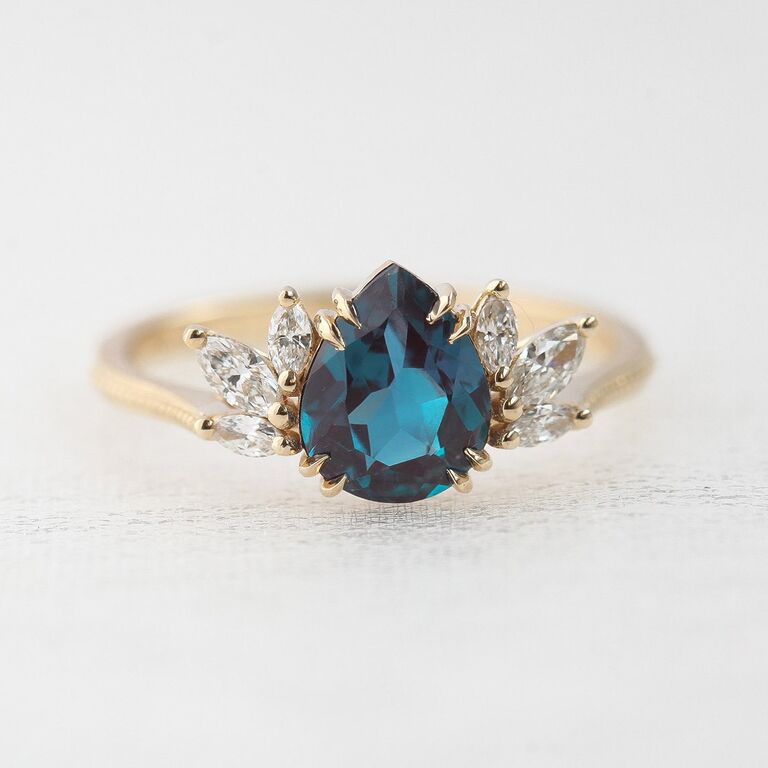
Alexandrite comes in a range of colors—and often boasts color-changing properties—so choosing a June birthstone engagement ring can come down to a matter of preference. This lab-grown blue alexandrite is cut in a stunning pear and surrounded by marquise diamonds in a cluster setting.
Staghead Designs Dorothea White Akoya Pearl Engagement Ring
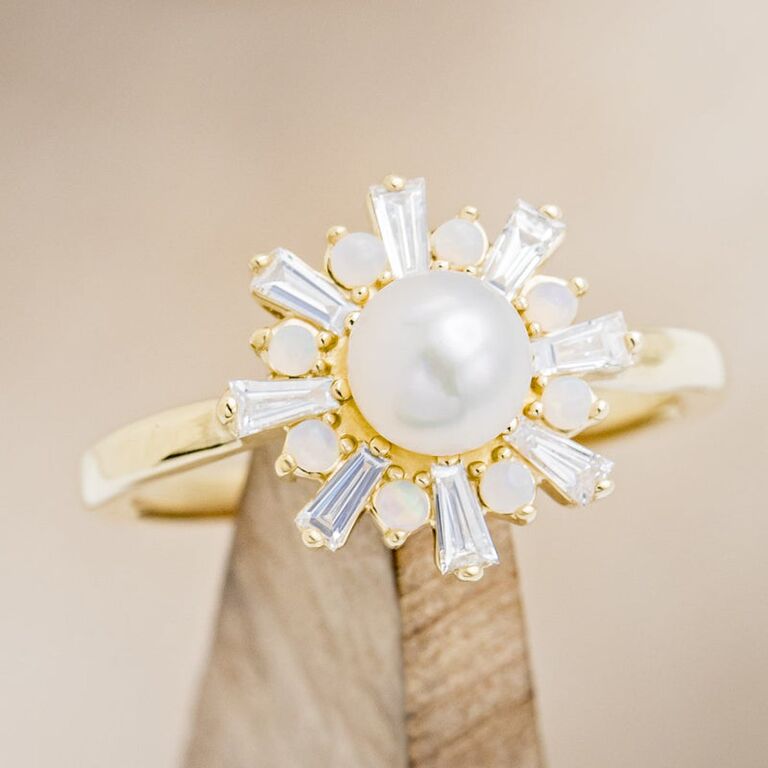
If vintage is your vibe, opt for a ring with art deco inspiration. Pearl fits uniquely into the aesthetic and here features as the center stone in a starburst of trapezoid diamonds and round opals. The handcrafted piece is set in 14-karat rose gold.
July Birthstone Engagement Rings
Rubies are among the most rare and valuable stones. Pure, untreated rubies can fetch in the millions of dollars; but luckily for July babies, the stone is much more readily available (and affordable) in still-beautiful treated or heated variations. The stone represents strength, passion and vitality, showcased in its vividly saturated color.
Logan Hollowell Queen Water Drop Ruby Ring
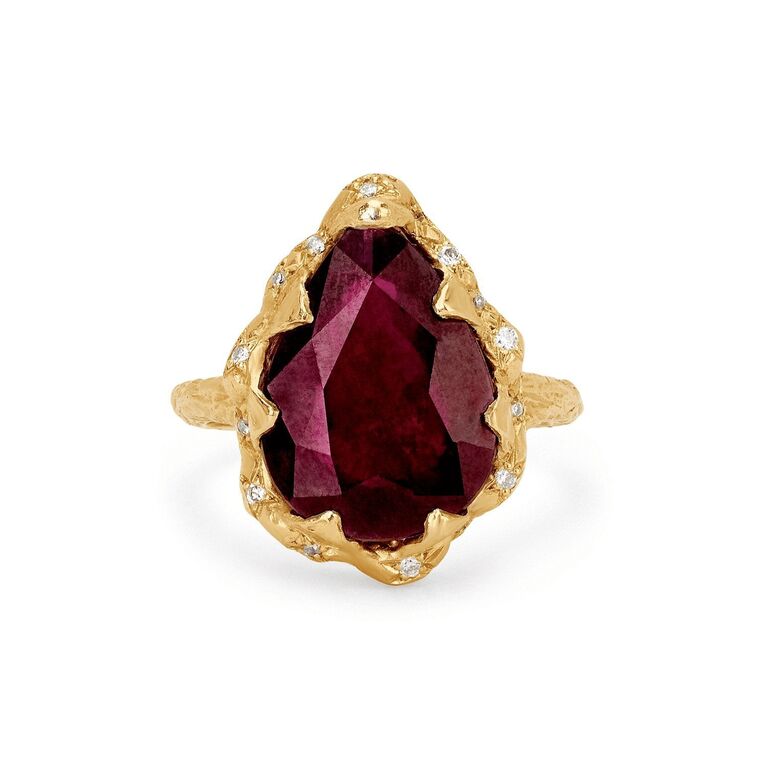
Enhanced or treated rubies are considerably less expensive than pure rubies, but the color can be just as vivid and deep. In jeweler Logan Hollowell's signature Queen setting, the stone gets the royal treatment, secured in an organic-inspired gold setting that's sprinkled with diamonds.
Alison Lou Heart Cocktail Ring

For those whimsical romances, lean into the color of love. This playful Alison Lou piece can serve as a gorgeous July birthstone engagement ring and gets its shot of red not just from the heart-shaped ruby but a border of two-tone enamel.
Eragem Vintage Ruby and Diamond Halo Ring
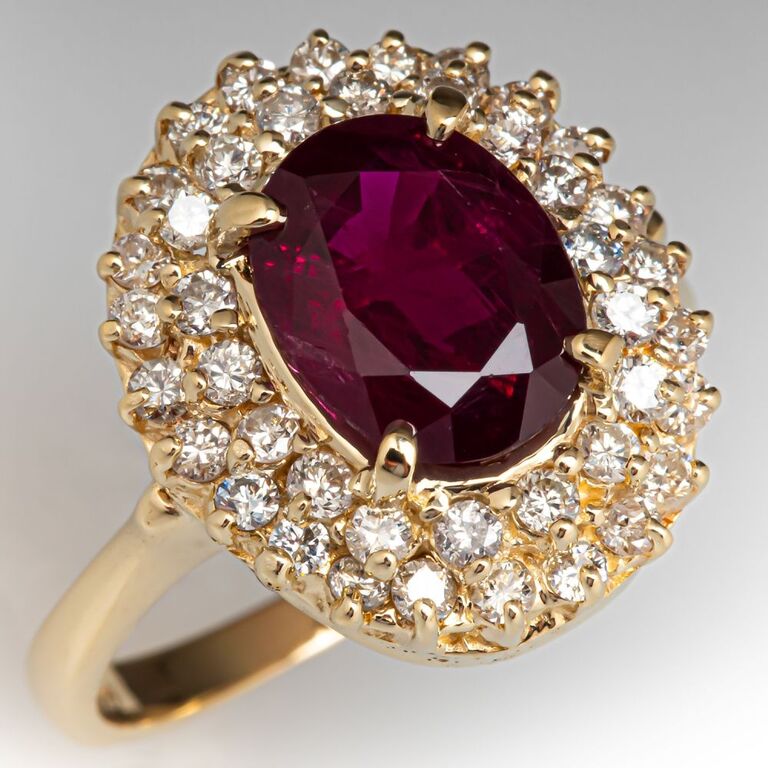
A one-of-a-kind estate piece, this stellar ring features an oval ruby and more than 40 round brilliant diamonds. The setting falls somewhere between a halo and a cluster and offers decidedly vintage appeal.
August Birthstone Engagement Rings
August birthdays are lucky: They've got not one or two but three birthstones to choose from—peridot, spinel and sardonyx—each with its own hue. The original birthstone is an opaque brownish stone with zebra stripes created by the mineral layering of sard and onyx; it's rarely used for rings. Of the modern birthstones, peridot has a greenish hue and has been said to ward off nighttime spirits due to its sunny vibrance. But Rosens' pick of the three—and one of her overall favorite birthstones for engagement rings—is spinel. "Spinel is often confused for ruby because of its deep color saturation and lack of visible inclusions; the chemical compositions are also similar," she says. " With a Mohs hardness of 7.5 to 8, a spinel is also durable enough to be worn every day. Spinel comes in almost every color of the rainbow, so there is something for everyone. Burmese red spinel and Mahenge spinel, a gorgeous reddish pink, are far rarer than a diamond, so they should be center stones. Red, blue and gray spinels have significantly grown in popularity as people look to create more unique engagement rings."
Long's Jewelers Platinum Red Spinel Diamond Halo Ring

An oval red spinel is set in an elevated halo in this August birthstone engagement ring from storied East Coast jeweler Long's. The mixed metals are a unique addition: yellow gold prongs hold the stone atop a platinum band.
Alexis Russell Ivy Ring with a Pear-Cut Peridot

Jeweler Alexis Russell's signature Ivy setting—which sees a trio of round diamonds clustered on either side of a unique center stone—works particularly well for green-hue peridot, which leans into the natural inspiration. The ring is handmade with ethically sourced stones and recycled 14-karat gold, so you can feel just as good as you look wearing it.
Diamondère Mahieu Peridot and Diamond Ring

A 1.6-carat peridot is the star of this deco-inspired ring (see the milgrain edging and geometric design), but the VS diamond side stones are nothing to sniff at, either. We can see this vibrant peridot ring at an outdoor garden wedding—and forever after.
September Birthstone Engagement Rings
Sapphire has been associated with a host of different symbolic meanings—from luck to love to spirituality—but chief among them is protection: The stone is said to protect its wearer from everything from physical harm to envy. And though it's been associated with royalty (maybe thanks in large part to Kate Middleton's famous sapphire engagement ring), it's also an American gemstone. "Montana sapphires are perfect for those looking for a center stone mined in the US," Rosen says. "With a Mohs hardness of 9, Montana sapphires are very durable for everyday wear and come in a variety of colors. Here's what makes this stone even more unique: You can dig it out of the ground yourself from a Montana mine." From there, a gem cutter and jeweler (Rosen recommends Jim Buday, who specializes in Montana sapphires) will custom cut your stone into a beautiful and meaningful piece to include in your engagement ring.
CustomMade Montana Sapphire Ring

Rosen herself designed this custom engagement ring in partnership with CustomMade, using what she considers "the nicest Montana sapphire I've ever seen." The teal-hued stone is cradled in wavy gold bands that seem to carry it in a floating setting. Rosen estimates the ring cost somewhere in the $6,500 range ($1,500 for the setting and around $5,000 for the stone); you can work with CustomMade to create something similar.
Alexis Russell Poppy Ring with Hexagon Sapphire

When you're going for something unique, why stop at color? This September birthstone engagement ring has a deep teal sapphire but also boasts a super unique cut in the hexagonal shape. Two delicate gold bands are spaced apart so it sits wide on the finger; pair it with a simple gold beaded band.
Nolan & Vada Leah Emerald Cut Blue Sapphire Engagement Ring

Nolan & Vada specializes in ethically sourced gemstone engagement rings and boasts a stunning selection of loose sapphires and sapphire jewelry. This 2.38-carat emerald cut sapphire has a vivid deep blue hue. It needs no accents but rather stuns as a solitaire in a trellis setting on a 1.9mm gold band.
October Birthstone Engagement Rings
October boasts two birthstones: one that works well for engagement rings and another that does not. "The truth is that opal is not a great ring stone; with a Mohs hardness of 5.5 to 6.5, it is too soft for an engagement ring," Rosen says. "They can be easily scratched or damaged with everyday wear, are sensitive to temperature changes, which can cause them to fracture, and are porous, which means everyday oils, lotions or even water can be harmful." Rosen suggests setting opals in pendant necklaces or earrings to be worn for special occasions. The good news? October's other birthstone, tourmaline, is especially recommended; it's one of Rosen's top picks. "Tourmaline is the modern birthstone for October, and Paraiba tourmaline has exploded in popularity and price over the last several years," she explains. "The neon blue color is unlike anything I've ever seen, and until recently, it was only found in Brazil, hence the name. More recently, deposits were found in Africa, though the price of Brazilian stones is still 10 times more than their African counterparts. Due to the discrepancy in value, this is a stone where you will want a certification of origin." Rosen predicts that Paraiba tourmaline will become a status symbol higher than diamond in due time. Plus, it ranks 7.5 on the Mohs scale, so it is durable for engagement rings.
CustomMade Tourmaline Engagement Ring

Tourmaline is one of the gemstones that comes in a variety of hues; the most common are pink and green tones. This setting, which can be recreated through CustomMade, has a classic engagement ring look with a surprising pink gem in place of the center diamond. It's an interesting and feminine pick—timeless and refreshing all at once.
Shreve, Crump & Low Paraíba Tourmaline and Diamond Ring in Platinum
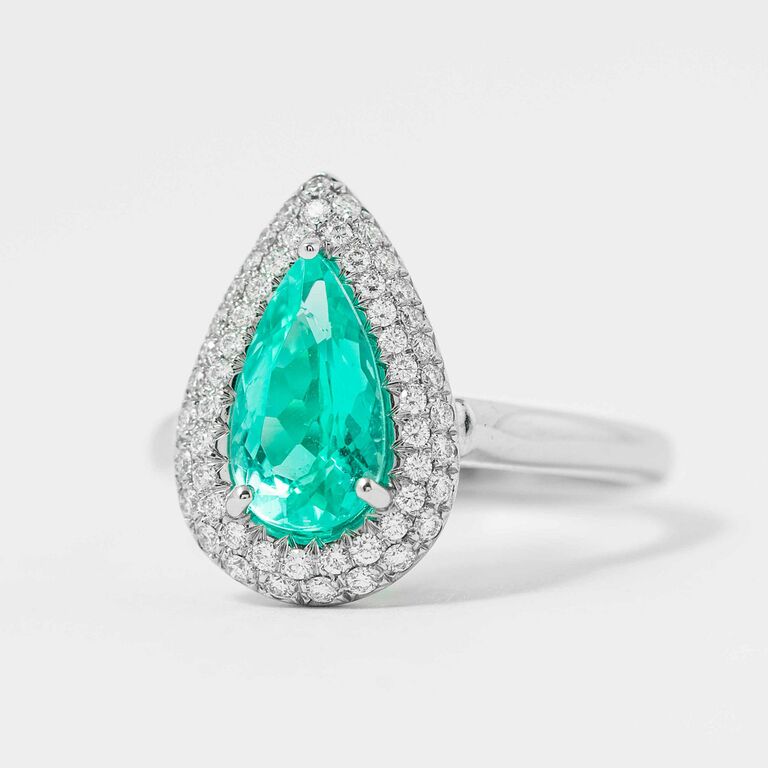
Rosen is a particular fan of Paraiba tourmaline. "This stone is guaranteed to turn heads and should be the star center stone in any engagement ring." It certainly is here: This ring features a 1.47-carat African Paraiba tourmaline and 56 round brilliant cut diamonds surrounding it. There's a lot of beauty to behold.
Alexis Russell Hazel Ring with Australian Opal
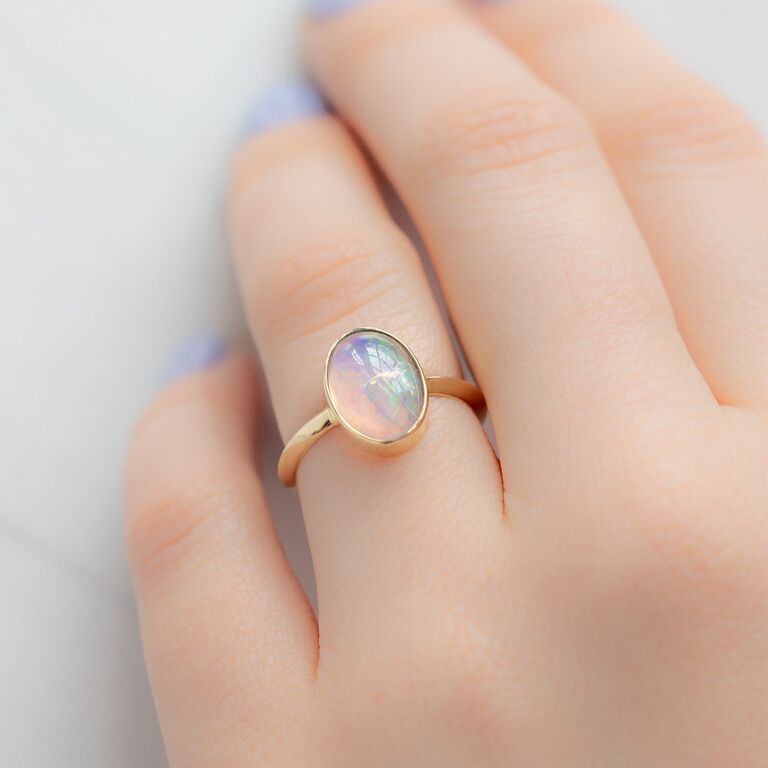
If you can't quite get your mind off opal—and who could blame you?—opt for a bezel setting, which better protects the delicate stone. This one features a 1.97-carat Australian opal; the stone represents light and magic, and it's easy to see why.
November Birthstone Engagement Rings
Topaz is the traditional birthstone; citrine and golden topaz are the modern takes. Either way, these stones are the colors of autumn reflected in a gemstone. Citrine is a variety of crystalline quartz with a yellow to red-orange hue; it represents healing in all its forms, from stomach aches to insomnia to—if we may—broken hearts. Plus, it's a durable and readily available stone, making it a practical and affordable option for engagement rings. Golden topaz, meanwhile, symbolizes inspiration and creativity—more concepts we love in a marriage.
Audry Rose Starry Citrine Ring
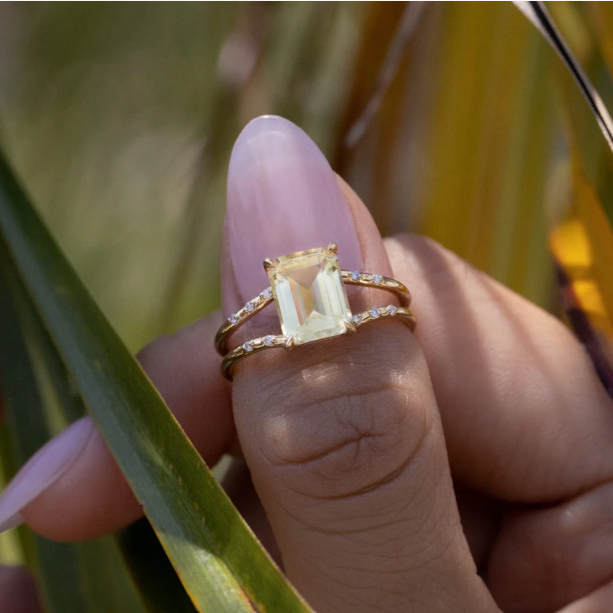
Dual gold bands suspend a sunny 2.5-carat citrine in this birthstone engagement ring for November. We love it for astrology-minded to-be-weds; the emerald-cut center stone is reminiscent of the sun, while a sprinkling of round diamonds embedded in the 14-karat gold band are the stars.
Bario Neal Amethyst and Citrine Cluster Ring

If making a statement is the goal, look no further. This ring features a massive 13mm round citrine—that translates to more than 5 carats, roughly—alongside an equally impressive pear-shaped amethyst. A cluster of unique champagne diamonds in round and marquise cuts fill in the negative space around the duo.
Angara Classic Solitaire Cushion Citrine Cocktail Ring

The golden, almost brown, hue of this citrine stone gives it a vintage feel that's actually completely on-trend. And you can't go wrong with a solitaire. This cushion cut piece is available in three different carat weights—1.9, 3.45 or 6—depending on how bold a statement you're trying to make.
Augustine Jewels Garnet and Orange Citrine Octagon Gold Ring
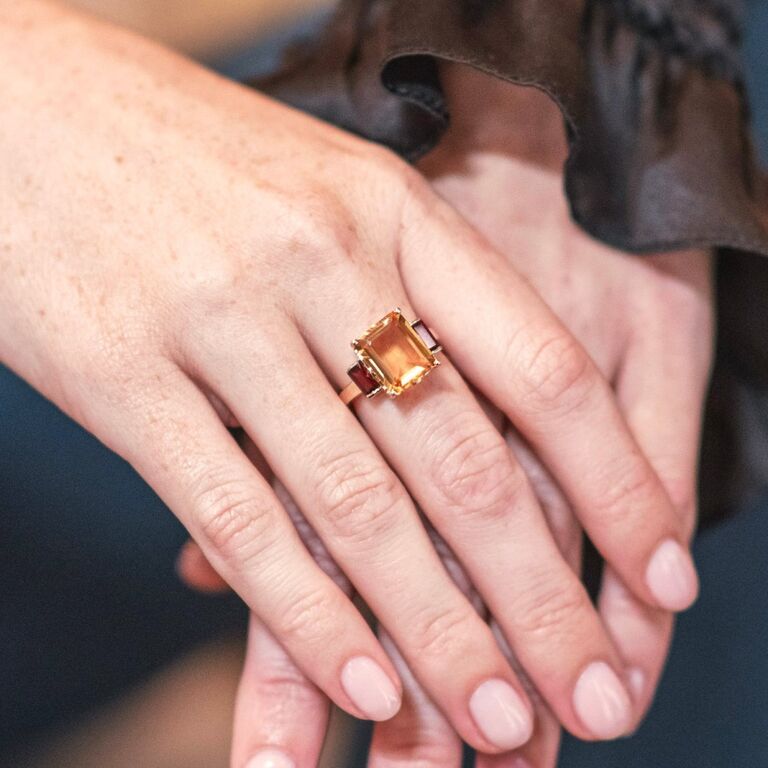
Inspired by the Andalusian region of Spain and its customary flamenco dance tradition, this ring features a uniquely cut octagon orange ring flanked by dual baguette garnets. It makes a beautiful engagement ring for November-born brides, especially those who are getting married to a January (garnet) partner.
December Birthstone Engagement Rings
Opaque turquoise is the traditional birthstone of December; it was replaced in modern times with more transparent blue topaz, tanzanite and zircon. But no matter which specific stone you prefer, December is represented by frosty blue hues that nod to the season as much as the stone. Wealth and good fortune are often represented by the blue stones—two auspicious concepts for a marriage—and turquoise specifically has been known to represent fertility. These stones are relatively affordable, and blue topaz in particular (which is heat-treated to reach its blue hue), makes for a great engagement ring option.
Brilliant Earth Soiree London Blue Topaz and Diamond Cocktail Ring
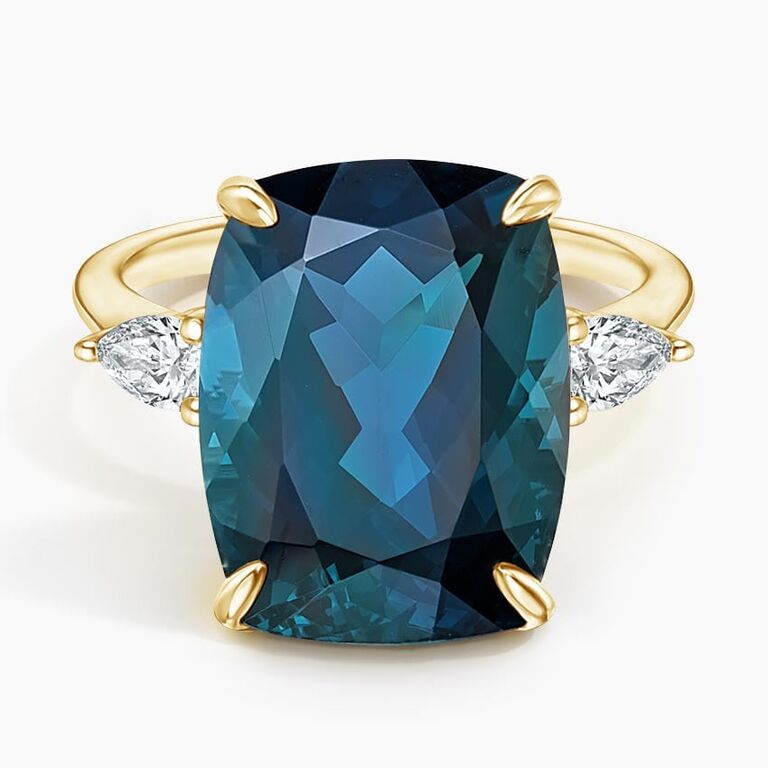
This three-stone ring was created in a limited edition, so you can guarantee your ring will be unique. Pear-shaped diamonds on either side of the focal stone help draw attention in and add a touch of sparkle.
Alexis Russell Aster Ring with a Sleeping Beauty Pear-Shaped Turquoise

Turquoise has an air of Southwestern flair that works well with a sunburst-inspired arrangement. Here, it's complemented by salt and pepper diamonds that add to the unique mystique. Pair this with an arched band crafted to fit around the peak of the pear; Alexis Russell has a perfectly complementary collection.
Emily Amey London Blue Topaz Ring With Diamond Clusters

Bezel-set diamond clusters flank a 2.85-carat London Blue topaz in this pretty December birthstone engagement ring. It's a one-of-a-kind piece, hand-set by female artisans in the jeweler's Hudson Valley studio; the metal is recycled and the stones are ethically sourced.

